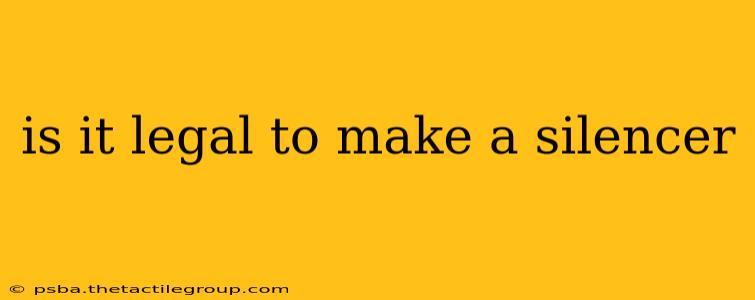The legality of making a silencer (more accurately termed a suppressor) in the United States is a complex issue, heavily dependent on location and adherence to strict federal and state regulations. The short answer is no, it's generally not legal to make your own suppressor without the proper licensing and registration. Attempting to do so can result in serious legal penalties.
Federal Regulations: The National Firearms Act (NFA)
The primary legal framework governing suppressors is the National Firearms Act (NFA) of 1934. This act classifies suppressors as "firearms" requiring registration with the Bureau of Alcohol, Tobacco, Firearms and Explosives (ATF). This means that even possessing a homemade suppressor is illegal unless you've gone through the extensive process of obtaining the necessary licenses and registering it with the ATF. This process includes a thorough background check and payment of significant taxes.
Key Aspects of NFA Compliance:
- Registration: Any suppressor must be registered with the ATF. This involves submitting detailed paperwork and paying a substantial tax.
- Licensing: Manufacturers and dealers of suppressors require specific licenses from the ATF. This is separate from the registration requirement for the suppressor itself.
- Background Checks: The ATF conducts thorough background checks on all individuals seeking to purchase or manufacture suppressors.
- Penalties for Non-Compliance: Penalties for violating the NFA are severe, including substantial fines and lengthy prison sentences.
State Laws: A Patchwork of Regulations
Beyond federal laws, states also have their own regulations regarding suppressors. Some states may have stricter laws than the federal government, adding further layers of complexity. It's crucial to research the specific laws in your state before even considering making or possessing a suppressor. These state laws may:
- Restrict ownership: Some states outright ban the ownership of suppressors.
- Require additional permits: Even if legal in the state, additional permits or licenses beyond federal requirements may be needed.
- Limit types of suppressors: Some states may place restrictions on the types or calibers of suppressors allowed.
The Risks of Homemade Suppressors
Beyond the legal ramifications, attempting to manufacture a suppressor at home is extremely risky. Improperly constructed suppressors can:
- Malfunction: Leading to injury or even death to the user or bystanders.
- Be ineffective: Homemade suppressors often fail to effectively reduce the sound of a firearm.
- Be unreliable: Their performance and durability can be significantly inferior to commercially manufactured suppressors.
Conclusion: Seeking Legal and Safe Alternatives
The process of legally obtaining a suppressor is rigorous but essential for responsible firearm ownership. Attempting to circumvent these regulations by creating your own suppressor is both illegal and inherently dangerous. If you're interested in using a suppressor, explore purchasing a commercially manufactured and legally registered suppressor from a licensed dealer. Always ensure you are fully compliant with both federal and state laws. Remember, consulting with a legal professional specializing in firearms laws is strongly recommended before taking any action regarding suppressors.

